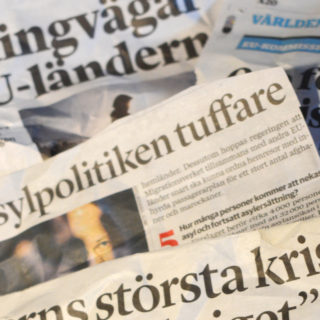Opinion Dick Harrison: The “refugee crisis” could be fruitful – with hindsight
“With hindsight, the refugee crisis of 2015 could very well emerge as one of our most fruitful cultural and economic processes of all time”, writes Dick Harrison, Professor of History.
IT IS OFTEN SAID THAT WE NEVER LEARN FROM HISTORY. The expression is sometimes used to illustrate human stupidity in general, and sometimes to observe the pointlessness of scrutinising the past. But the statement is false. A better guide to human behaviour than history is hard to find. The problem is that very few people are willing to take in the lessons learnt by historians as part of their job. The truth is sometimes hard to digest, in particular for members of political movements whose perspective requires a particular type of history to legitimise their own existence.
This has seldom been as obvious as during the past autumn, when appeals for open borders and hearts were interspersed with outpourings about how we can’t take in any more refugees and how Swedish society risks going under. Almost none of the politicians who expressed themselves on the matter referred to the extensive experience offered by history.
“Sweden only has inhabitants thanks to various waves of immigration since the retreat of the last glaciers”.
It is obvious to all history scholars, in particular if we apply a long term perspective, that the meeting of cultures enriches the participating civilisations and that all countries and people who welcome peaceful immigrants benefit from doing so in the long run. I do not know of a single example to the contrary. The only migrations which have been directly damaging to the recipient countries are those that have taken the form of wars, pillage and imperialist colonisation. That the world is populated at all depends on the ancient migration of hominids from Africa. Sweden only has inhabitants thanks to various waves of immigration since the retreat of the last glaciers.
EVEN IF we limit our observations to the influx of people to our own country over the past thousand years, immigration emerges as one of the most culturally and societally constructive forces that have contributed to shaping the country’s politics and economy. The extensive immigration of Germans during the 13th and 14th centuries resulted in a Europeanisation of the form of government, the foundation of cities and an impressive modernisation of mining and commerce. The Swedish Empire of the 1600s would never have come to pass without the immigration of experts – from military commanders and wealthy bankers to ordinary workers and slash and burn farmers – from half of Europe. The same can be said of Swedish industrialisation in the 1800s, which was to a large extent the work of foreign entrepreneurs, as well as the expansion of the welfare state between the 1940s and the 1970s, which was sustained not only by native Swedes but also by the hundreds of thousands of immigrant workers and tens of thousands of refugees who found their way here.
TO PUT IT BRIEFLY: With hindsight, the refugee crisis of 2015 could very well emerge as one of our most fruitful cultural and economic processes of all time. Not that this sort of calculation should guide what is fundamentally a question of solidarity and humanism, but this reasoning can be worth bearing in mind as Europe’s right-wing populists compete to compare current migration to the biblical flood.
Dick Harrison, Professor of History at Lund University

Dick Harrison






